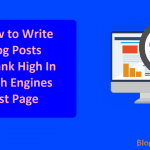Keywords are one of the lifelines of your blog. They dictate what a certain blog post is all about. They drive traffic towards your blog. They are the reason why people look for content on your blog.
Keywords are that powerful. Hence, learning the proper way to use keywords in your WordPress blog posts is a must.
This post will tackle keywords in a bit more detail, plus show helpful tips for effective keyword use within a WordPress blog post.
Contents In Page
What Are Keywords, Exactly?
Ever went to a search engine and typed up a few words about a topic you want to look for, such as “customizing WordPress blogs”, “food delivery in New York”, or “cheap maxi dresses”?
Yes, the strings of words you’re looking up on a search engine are keywords for a specific niche or topic.
Simply put, a keyword is either a single word or a string of words that pertains to the topic you want to write about on your blog posts.
It is the very words that Internet users type on search engines like Google, Bing, and Yahoo.
Keywords actually exist to lead the wandering and curious Internet user down to a certain blog post, which he views to satisfy his needs.
To further illustrate, this post you are reading right now can have the following keywords in it:
- Keywords
- Keywords in WordPress posts
- Effective keyword use
It all boils down to the specific topic a blog post is pertaining to.
Why Is It So Important in WordPress Posts?
Your WordPress blog needs to rank high in search engines if you want your content to reach as many people as possible.
This means when a person searches for content related to your blog on a search engine, that search engine recognizes your blog and lists you among the first few pages of their search engine results, helping people see and read your blog posts.
Now, keywords play a vital role in improving your search engine rankings.
Keywords in your article must be carefully selected to match those that blog audiences in your niche frequently type and search for.
In that way, search engine algorithms can find your blog posts and display it high enough on their index for your target blog audience to see.
Your blog post then gains traction, views, and an online following.
Search engines are often the doors that lead your blog readers to you.
That’s why you need to smartly utilize keywords in your blog posts to ensure that whatever it is you have in your WordPress blog reaches your intended audience.
Tips in Integrating Keywords to Your WordPress Posts
You probably have gotten a grasp of the big role keywords play in the success of your WordPress posts.
Keywords can make or break your articles.
They are the driving force by which your blog posts would be known to the world.
With that said, here are some tips to keep in mind for effective keyword use in your blog posts.
1. Strategically Place Them on Your Blog Posts
Keywords can appear on several places in your posts.
They can be used within the title, headings, the entire post content, meta description, and even on the URL.
You must spread the use of your keywords within your entire post.
But, be careful not to overdo it. Here are the reasons why a little keyword or two is needed in the following parts of your post:
2. In the Title Tag
Your blog’s title must contain your keyword.
This is because the title tag is an introduction of your post, both to your readers and to search engines.
Having the keyword strategically included in the title tag means that search engines can easily find your blog post and display it for a user who entered that specific keyword as a query in the search engine platform.
Focus well on optimizing your title with your chosen keywords; it must have the right mix of informativeness and algorithm-friendliness.
Check out Google AdWords Keyword Planner to help you figure out the high-ranking keywords and phrases on your niche.
3. In the Heading Tags
Do not limit your keywords at the title of your blog post alone. Include some of them on your post’s heading tags as well.
Headings do a great job in structuring the content of your post.
Having your keywords properly inserted in a heading or two improves the scanability of your blog post, and lets your readers get the flow of your articles.
4. Within the Body of the Blog Post
You must also place your keywords within your article body.
This reinforces the topic of your blog post and further asserts to search engines the authority you have over your chosen topics.
Aim to get the right keyword density for the length of your post.
Keyword density means the number of keywords you include within your articles.
It is suggested that a density of 1-3% is enough for search engines (especially Google) to find your blog and index it high enough on their search pages.
5. In the Meta Description
Meta description is an HTML tag that summarizes your blog post or webpage.
It is often 155-160 characters long, and is displayed by search engines on their actual search results pages to give the viewers a glance of what a certain webpage is all about.
Given that the meta description lands on the search results pages itself, it is crucial to optimize it with your blog post’s keywords.
Inserting your keyword as naturally as possible in your meta description can prompt a search engine to consider your post as a potentially helpful search result, and thus displays your blog post when a user searches for your keyword online.
Search engines will most likely include your blog post in its results page if your keyword appears in your description.
6. In the URL Permalink
URLs also play a vital role in search engine optimization.
This means that search engines will most likely index your blog posts if their URLs carry a keyword or two, rather than it being a jumbled mix of letters, numbers, and characters.
For instance, this article can be indexed by Google as follows:
https://www.blogbeginner.com/12345ABCDE-123/
But, you can tweak this URL before publishing the post so that it looks something like this:
https://www.blogbeginner.com/how-to-use-keywords/
Google will prefer to show users the second text-based URL rather than the first one because it quickly gives the users a sneak peek of what the article is about, unlike the first URL.
The second URL is miles ahead of the first one for its user-friendliness, isn’t it?
Be sure to edit your blog post’s URL to reflect your keywords before your posts get published and go live. It can be hard to edit permalinks once it’s already being circulated online.
WordPress uses ‘?p=[id] permalinks for its posts as a default.
This will result to a page URL similar to the first example above.
By all means, switch to the text-based structure for your permalink so that you can add your relevant keywords to your final URL.
You can easily do this via your admin dashboard.
Also, remember to use 10-15 words at the most for your blog permalink.
Too much text in the permalink will make it harder for users to remember your blog post.
Search engines are also most likely to favor short to medium-length URLs that are descriptive in nature, so be sure to plan your permalinks well.
To wrap this tip up, placing keywords properly in all these parts of your articles helps ensure that your blog posts are optimized for search engines, increasing the chances for them to be read by your target audience.
7. Emphasize Strong Keywords in the First Paragraphs of Your Article
The first 100 words of your WordPress post is crucial in Google indexing.
Placing your strongest keywords within the first few paragraphs of your articles can do wonders for your search results rankings.
Write a powerful description of your blog post within the first 100 words and include your keywords naturally throughout this part.
Short but strong post descriptions are your best bets.
You need not elaborate too much on what the blog post is about, just get the basic facts out there and insert your strong keywords.
You have the rest of your post to elaborate on your main topic; focus on getting a strong introduction for your blog so that both readers and search engine algorithms will get a sense of what your blog is about at first glance.
8. Avoid Keyword Stuffing
As much as you would like to include keywords in every part of your blog post, bear in mind that too much of it can kill your chances of ranking high on search engines.
Keyword stuffing means that you’ve loaded your blog posts with too many keywords.
Your articles are screaming with keywords and are not natural enough when you read its entirety.
Too many keywords in your WordPress post is distracting to readers and to search engines alike.
An example of keyword stuffing would look something like this:
“Are you looking for the best beach destination in Asia?
Then take a look at this list of the best beach destinations in Asia; we’re sure you’ll find inspiration on where to go for the best beach destination in Asia in this blog post!”
Guess what the keyword phrase is in the example above?
Keyword stuffing is repetitive and plain spammy. That’s why search engines and even readers hate seeing posts like this.
The early stages of search engine optimization (SEO) had search engines value the number of keywords included in a blog post.
The more keywords stuffed everywhere, the higher they ranked on search results pages.
That is why mechanical-looking posts that are nothing but a bunch of repetitive keywords strung together in the entire article have gained higher ranks in search engines than natural-looking posts before.
But now, search engines got smarter.
Who wants to read a bunch of keywords disguised as a blog post today? Search engines now value the quality of blog content over repetitive keyword usage.
Algorithms tend to shun down posts that have too crowded keywords, favoring those articles that flow more naturally in their content.
You can avoid keyword stuffing by following these tips:
- you’ll be using:
Avoid using low-value keywords and start including top-ranked keywords according to your niche.
WordPress offers tools and plugins to help you do basic keyword research before you start writing your posts.
- Stop using grammatically-incorrect keyword phrases:
Don’t use them just because they score high on Google rankings.
Randomly inserting a grammatically incorrect phrase such as keyword stuffing not good in your articles will make your post sound too stiff and well, grammatically incorrect.
Even if you reached the desired keyword density, Google will still frown upon your post because it’ll look mechanical and unnatural.
Better to correct that keyword phrase to keyword stuffing is not good; the chances of ranking better in search engines goes higher.
- Make an effort to increase your word count:
This way, you’re not forced to insert your keywords in every sentence of your paragraph.
Bear in mind that adding fluffy content just for the sake of higher word count and more space for keywords isn’t a good idea, either.
Make those additional word counts valuable for your readers, and Google will surely take notice.
9. Use a WordPress Plugin for SEO
WordPress isn’t inherently SEO-friendly. You have to work to perk up your site’s SEO with the proper use of keywords, as well as other elements in your blog.
But you may also choose to manage your post’s keywords by choosing one of the many WordPress SEO plugins available.
Using a plugin doesn’t mean lesser work for you, though.
You still have to pay attention to how your keywords are arranged, and you’ll likely improve your blog’s stats in no time.
Some of the popular plugins to help you with keywords and SEO include the following:
- WordPress SEO by Yoast
- Google Keyword Planner
- SEMrush
You can utilize these plugins if you find that they make keyword planning for your blog posts easier.
The Takeaway
Optimizing your WordPress blog posts so that search engines can actually display them on their results pages takes a lot of planning and consideration.
That being said, keywords play a vital role in making a blog known to its target audiences.
Including keywords in various parts of a blog post makes it easier for both search engines and users to find your blog online.
Pay attention to naturally inserting keywords on the title, the first few paragraphs of your post, and the URL permalinks to get better results.
While keywords work wonders in enriching your posts for search engines, too much of it can do the opposite.
Keyword stuffing is spammy, makes your posts look and feel robotic, and leads search engines to flag your blog post and possibly penalize you for it.
If you need more help in planning keywords for your posts, you can also utilize WordPress plugins for SEO.
Lots of plugins are out there for you to discover and try out.
Simple tweaks to the keywords in your WordPress blog post can bring your site up from being an unknown to being an authority in your niche.
So, start researching and planning your posts now, and don’t forget to take all these keyword tips to heart, and apply them to your blog. Search engines and your readers will surely take good notice of your efforts.








